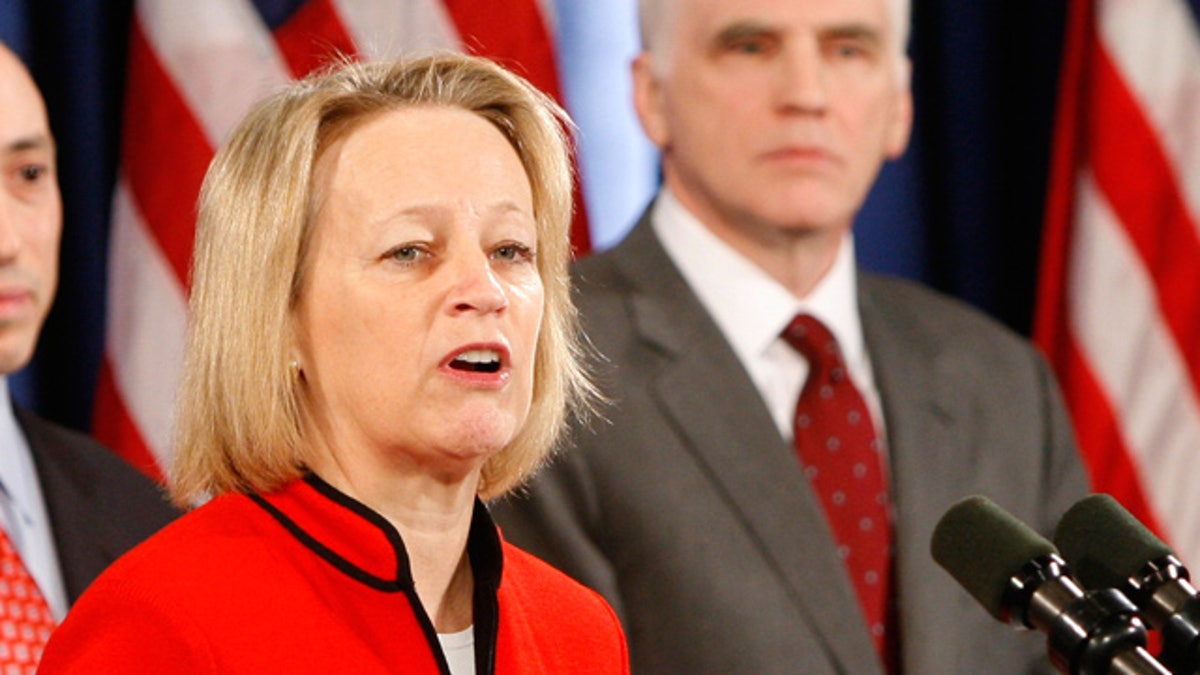
SEC Chairman Mary Schapiro (Reuters)
The alphabet-soup federal bureaucracies seem to be engaged in a contest to see who can do the most to steamroll the legitimate legislative process and compromise freedom and economic growth.
To date it has been a neck-and-neck race between the EPA, which is pursuing a head-spinningly aggressive anti-energy and anti-development agenda, and the NLRB, which is rewriting federal labor laws to allow union bosses to force workers into unions and infamously sued Boeing for locating in a right-to-work state. Of course, the FDA, HHS, IRS, FCC and the rest also have been in the act.
But the Securities and Exchange Commission (SEC) is now distinguishing itself as a new contender in the top tier of the worst rogue agencies.
Left-wing activists have long viewed corporate boardrooms as an alternative venue to accomplish radical policy objectives that lack the public support needed to advance through the legislative process. Extreme environmentalists have pushed their philosophy through that mechanism, as have union bosses, through the use of so-called corporate campaigns to strong-arm and intimidate corporations. Activists have increasingly turned to another mechanism -- so-called shareholder proposals, questions included in a company’s proxy materials -- as a way to advance policy objectives.
The strategy was outlined by Saul Alinsky in his classic “Rules for Radicals.” Alinsky explained: “Remember that the objective of the proxies approach is not simply a power instrument with reference to our corporate economy, but a mechanism providing for a blast-off for middle-class organization -- beginning with the proxy, it will then begin to ignite other rockets on the whole political scene from local elections to the Congress.”
Last week, the SEC handed the Alinkskyites a very surprising victory, up-ending all relevant precedents that preclude shareholder questions on routine business matters. Instead, now activists will be allowed to force several broadband companies to offer shareholder questions to restrict their operations to comply with so-called network neutrality rules.
This is a far more draconian version of the rules the FCC unlawfully imposed in late 2010, which are likely to be struck down in federal court because they lack any statutory basis. Moreover, these rules -- according to their strongest proponents -- are designed to undermine private investment and transform the Internet from a vibrant, innovative private-sector success to a strictly regulated public utility, or an outright nationalized, taxpayer-funded government network.
The ideological godfather of the so-called media reform movement, an avowed Marxist college professor named Robert McChesney, founded the pressure group Free Press to push for these regulations. McChesney’s group receives considerable funding from the Nathan Cummings Foundation, the left-wing funder that sponsored the network neutrality shareholder proposals approved by the SEC.
McChesney has explained: “At the moment, the battle over network neutrality is not to completely eliminate the telephone and cable companies. We are not at that point yet. But the ultimate goal is to get rid of the media capitalists in the phone and cable companies and to divest them from control.”
Here the SEC has forced companies to include a suicide proposal with its proxy statement. The companies involved should challenge and defeat this decision in court, or risk allowing a chilling precedent that would open the door for big left-wing foundations to undermine capitalism from within companies, without bothering the messy democratic business of elections and legislation.
But there’s even more bad news coming out of this agency. The SEC is also considering a proposal from a dozen or so high-profile college professors to do an end-run around Citizens United and impose a major backdoor restriction on political speech by forcing disclosure requirements on publicly traded corporations.
There is no evidence that shareholders broadly support any such requirement. In fact, fully 67.5 percent of shareholders do not support such disclosure. To force it via regulatory fiat is therefore directly contrary to the principle of shareholder democracy.
This proposal to get the SEC into the business of regulating political speech cannot be justified as in the interests of shareholders, yet filings from 15 Senate Democrats, led by New Jersey Sen. Robert Menendez, and 43 House Democrats, led by Massachusetts Rep. Michael Capuano, have urged the SEC to transform itself into a political speech regulator.
The SEC has not yet acted on this proposal, but its frightening new activism on shareholder proposals suggests a high likelihood that it will.
This is the same SEC that already attempted to give the left its biggest goal -- the so-called proxy access rule, which would have allowed big union-controlled pension funds and radical green foundations to directly nominate their own candidates for boards of directors right on companies’ own proxy statements. That rule was struck down in federal court, but SEC Chairman Mary Schapiro has vowed to bring it back in modified form.
If the SEC succeeds in letting left-wing activists advance their policies through these backdoor mechanisms, it will earn a spot in the top tier of Obama rogue agencies. Congratulations to them, but what a shame for economic freedom in America.
Phil Kerpen is vice president for policy at Americans for Prosperity and the author of Democracy Denied (BenBella Books, 2011).
